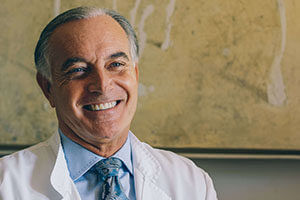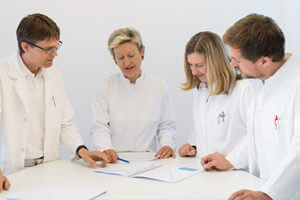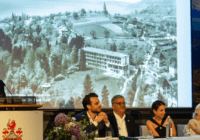MEDICAL CONGRESS IN MARBELLA
Fasting as an efficient non-pharmacological approach to healthy longevity
The Buchinger Wilhelmi Clinic Marbella organised a medical congress in October as part of the 50th anniversary activities in 2023. The pursuit of a long and healthy life is a universal desire. In this congress, experts dived into the fundamental non-pharmacological aspects of our lives that influence healthy longevity.
Major scientific discoveries made by the Buchinger Wilhelmi scientific team
The day started with a presentation of the discoveries made by our scientific team. The Buchinger Wilhelmi clinics have now become one of the largest instituions for clinical research on fasting worldwide.
Dr. Françoise Wilhelmi de Toledo, our medical scientific director, shed light on the body’s remarkable ability to transition between different sources of energy when food is not available, utilizing stored fats during fasting. Our body’s mechanism can be compared to that of a hybrid car, with genetic programs to safely switch from the energy extracted from food to the energy stored in our body. This provides a foundation for personalized health strategies, unlocking potential avenues for optimizing well-being and harnessing the body’s innate resilience.
Dr. Franziska Grundler and Dr. Robin Mesnage summarised major scientific discoveries in our research program, with all publications now freely available in open access on scientific databases (to our publications).

Dr. Robin Mesnage
Personalized fasting regimens as potential treatments for diseases
The scientific speech was followed by a presentation from Dr. Younes Regragui, the of the Marbella’s clinic, who along with his dedicated team Ulla Höhn, Luz Còzar, Facundo Diamante and Irene Urdiales, showed how modern scientific knowledge can be integrated for the creation of personalized fasting regimens as potential treatments for diseases such as diabetes. The comprehensive approach adopted by the team encompassed not only nutritional considerations but also delved into the realms of sleep, psychology, and exercise. Our medical concept is evolving, and we are now considering 6 pillars of health.
A compelling case study shared during the session highlighted the transformative impact of this integrative approach. A diabetic patient with severe depression symptoms fasted several times at the Buchinger Wilhelmi Clinic Marbella. During each of his 3 stays he could achieve significant enhancements in glucose regulation, reduced is fatty liver disease, achieved sustainable weight management, and improved his well- and overcome his depression.
Spontaneous fasting in wild animals
We also had the pleasure of listening to Dr. Yvon Le Maho who talked about spontaneous fasting in wild animals, while in the middle of a fast himself. Dr. Yvon Le Maho highlighted that almost every animal is naturally fasting intermittently in the wild.
Fasting is an adaptation to natural rhythms: the alternance of day and night and the alternance of seasons. Evolution has equipped our cells with mechanisms to optimise the function of our body during these periods of fasting.
Every mammal is equipped with protein sparing mechanisms so that they burn safely fat during fasting, while preserving their muscles. These safety mechanisms can be activated by physical activity, which suggests that maintaining physical activity is important during fasting.

The importance of physical activity was confirmed by Dr. María Jesús Núñez who delved into the integral role of physical exercise in maintaining overall well-being. Her insights underscored the profound impact that regular exercise can have not only on physical health but also on mental and emotional stability.
Gut microbiota health, mental well-being and sleep quality
We were honoured to host Xevi Verdaguer at the Buchinger Wilhelmi Clinic, where he delivered an enlightening talk connecting gut microbiota health with mental well-being and sleep quality during fasting. Verdaguer’s expertise shed light on the intricate relationship between our gut and overall health. His insights provided a valuable perspective for our attendees, offering a deeper understanding of how lifestyle choices, particularly fasting, can influence not only physical health but also contribute to mental resilience and improved sleep.
Three simple sets of recommendations to cherish our gut and our brains
Thousands of toxic chemicals in our daily lives
In a thought-provoking address, Pilar Muñoz Calero shed light on the crucial connection between our environment and our health during the recent clinic event.
Dr. Muñoz emphasized the symbiotic relationship between our bodies and the environment, underscoring how the well-being of one is intricately linked to the health of the other. Her insights brought attention to the pervasive presence of thousands of toxic chemicals in our daily lives, originating from sources such as the food we consume, the water we drink, and the air we breathe.
This revelation underscores the pressing need to conscientiously minimize our exposure to these harmful substances. Dr. Muñoz advocated for simple yet effective lifestyle changes, urging individuals to reduce their reliance on plastics, opt for natural cosmetics, and choose eco-friendly cleaning products. Importantly, she highlighted the environmental impact of pharmaceuticals, emphasizing the need to explore non-pharmacological alternatives like fasting before resorting to medications. The reminder that the use of medications can have far-reaching consequences on our ecosystems, particularly when they find their way into rivers or oceans, serves as a call to action for both healthcare providers and patients alike.
The 6 pillars of health – Conclusion
Finally, the following six pillars of health were discussed as efficient non-pharmacological approaches for a healthy, long life:
- nutrition
- fasting
- emotional balance
- physical activity
- environmental quality
- sleep
In conclusion, the congress explained how six pillars of health are efficient non-pharmacological approaches to healthy longevity. The diverse insights underscored the clinic’s commitment to advancing scientific knowledge and integrating a comprehensive understanding of health, providing valuable takeaways for our attendees keen on optimizing their well-being.









